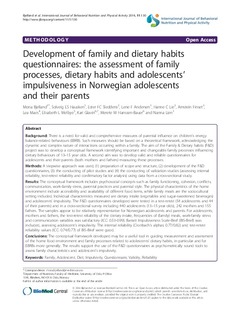| dc.contributor.author | Bjelland, Mona | |
| dc.contributor.author | Hausken, Solveig E. Sand | |
| dc.contributor.author | Sleddens, Ester FC | |
| dc.contributor.author | Andersen, Lene Frost | |
| dc.contributor.author | Lie, Hanne Cathrine | |
| dc.contributor.author | Finset, Arnstein | |
| dc.contributor.author | Maes, Lea | |
| dc.contributor.author | Melbye, Elisabeth Lind | |
| dc.contributor.author | Glavin, Kari | |
| dc.contributor.author | Hanssen-Bauer, Merete Waage | |
| dc.contributor.author | Lien, Nanna | |
| dc.date.accessioned | 2015-04-13T09:53:28Z | |
| dc.date.accessioned | 2015-11-20T15:27:16Z | |
| dc.date.available | 2015-04-13T09:53:28Z | |
| dc.date.available | 2015-11-20T15:27:16Z | |
| dc.date.issued | 2014 | |
| dc.identifier.citation | Bjelland et al. : Development of family and dietary habits questionnaires: the assessment of family processes, dietary habits and adolescents ’ impulsiveness in Norwegian adolescents and their parents. International Journal of Behavioral Nutrition and Physical Activity 2014. 11:130 | nb_NO |
| dc.identifier.issn | 1479-5868 | |
| dc.identifier.uri | http://hdl.handle.net/11250/2365046 | |
| dc.description | This article was originally published in International journal of behavioral nutrition and physical activity under a CC BY license; doi:10.1186/s12966-014-0130-z | nb_NO |
| dc.description.abstract | Background: There is a need for valid and comprehensive measures of parental influence on children’s energy balance-related behaviours (EBRB). Such measures should be based on a theoretical framework, acknowledging the dynamic and complex nature of interactions occurring within a family. The aim of the Family & Dietary habits (F&D) project was to develop a conceptual framework identifying important and changeable family processes influencing dietary behaviours of 13–15 year olds. A second aim was to develop valid and reliable questionnaires for adolescents and their parents (both mothers and fathers) measuring these processes.
Methods: A stepwise approach was used; (1) preparation of scope and structure, (2) development of the F&D questionnaires, (3) the conducting of pilot studies and (4) the conducting of validation studies (assessing internal reliability, test-retest reliability and confirmatory factor analysis) using data from a cross-sectional study.
Results: The conceptual framework includes psychosocial concepts such as family functioning, cohesion, conflicts, communication, work-family stress, parental practices and parental style. The physical characteristics of the home environment include accessibility and availability of different food items, while family meals are the sociocultural setting included. Individual characteristics measured are dietary intake (vegetables and sugar-sweetened beverages) and adolescents’ impulsivity. The F&D questionnaires developed were tested in a test-retest (54 adolescents and 44 of their parents) and in a cross-sectional survey including 440 adolescents (13–15 year olds), 242 mothers and 155
fathers. The samples appear to be relatively representative for Norwegian adolescents and parents. For adolescents, mothers and fathers, the test-retest reliability of the dietary intake, frequencies of (family) meals, work-family stress and communication variables was satisfactory (ICC: 0.53-0.99). Barratt Impulsiveness Scale-Brief (BIS-Brief) was included, assessing adolescent’s impulsivity. The internal reliability (Cronbach’s alphas: 0.77/0.82) and test-retest reliability values (ICC: 0.74/0.77) of BIS-Brief were good.
Conclusions: The conceptual framework developed may be a useful tool in guiding measurement and assessment of the home food environment and family processes related to adolescents’ dietary habits, in particular and for EBRBs more generally. The results support the use of the F&D questionnaires as psychometrically sound tools to assess family characteristics and adolescent’s impulsivity. | nb_NO |
| dc.language.iso | eng | nb_NO |
| dc.publisher | BioMed Central | nb_NO |
| dc.rights | Navngivelse 3.0 Norge | * |
| dc.rights.uri | http://creativecommons.org/licenses/by/3.0/no/ | * |
| dc.subject | dietary habits | nb_NO |
| dc.subject | diet | nb_NO |
| dc.subject | diett | nb_NO |
| dc.subject | reliability | nb_NO |
| dc.subject | family | nb_NO |
| dc.subject | familier | nb_NO |
| dc.subject | impulsivity | nb_NO |
| dc.subject | adolescents | nb_NO |
| dc.subject | ungdommer | nb_NO |
| dc.title | Development of family and dietary habits questionnaires: the assessment of family processes, dietary habits and adolescents’ impulsiveness in Norwegian adolescents and their parents | nb_NO |
| dc.type | Journal article | nb_NO |
| dc.date.updated | 2015-04-13T09:53:28Z | |
| dc.subject.nsi | VDP::Medical disciplines: 700::Health sciences: 800 | nb_NO |
| dc.source.volume | 11 | nb_NO |
| dc.source.journal | International Journal of Behavioral Nutrition and Physical Activity | nb_NO |
| dc.identifier.doi | 10.1186/s12966-014-0130-z | |
| dc.identifier.cristin | 1165108 | |

